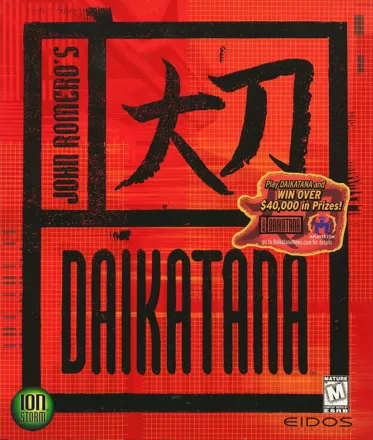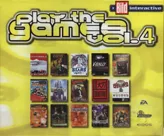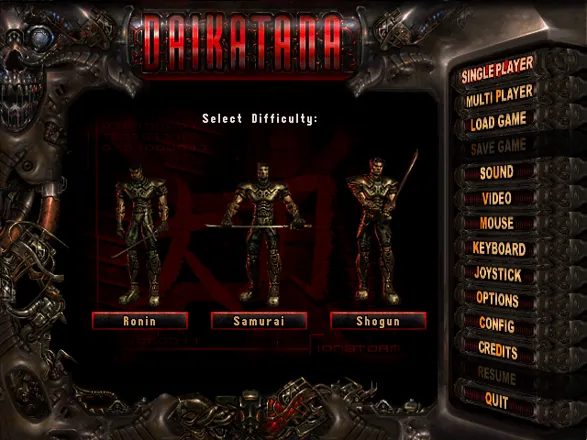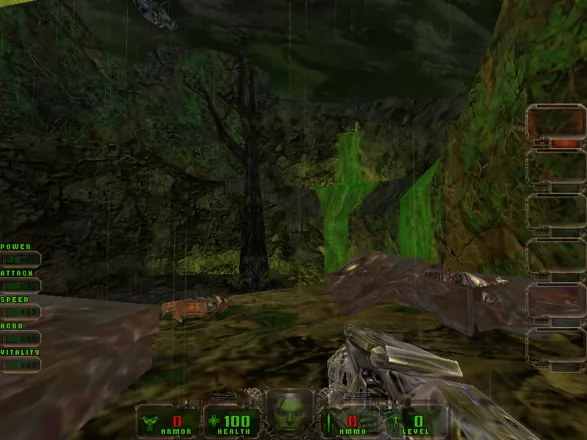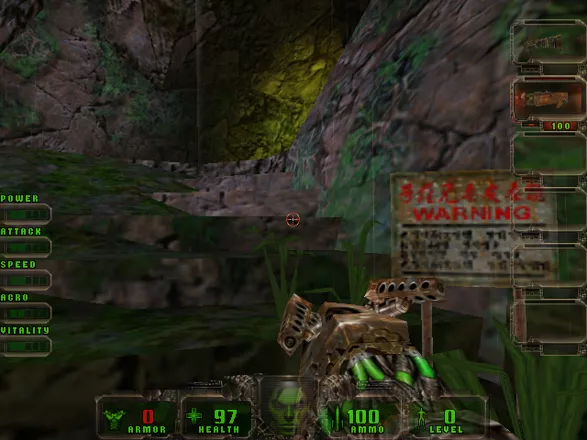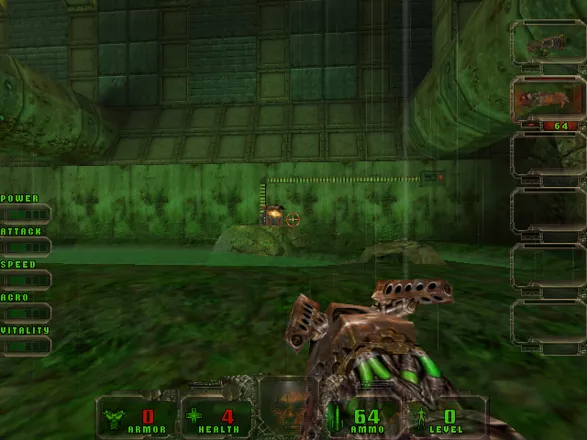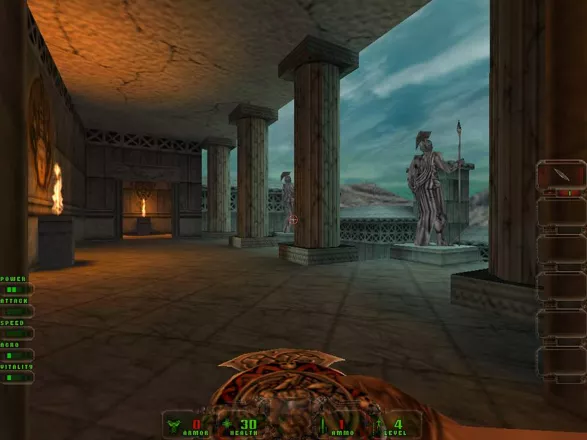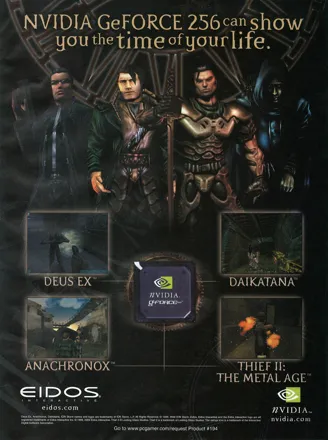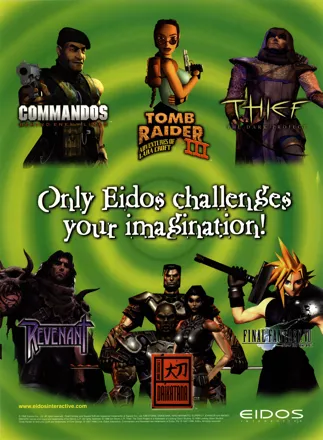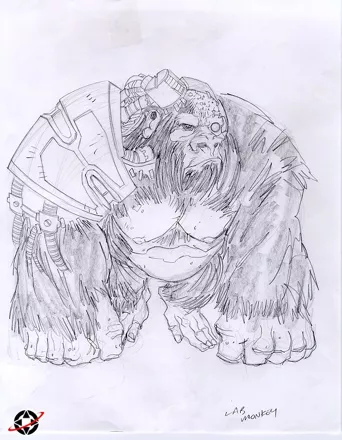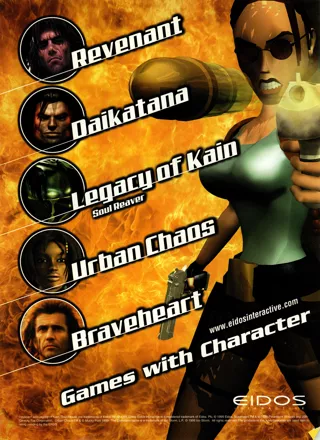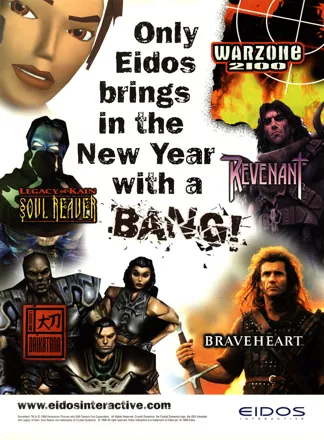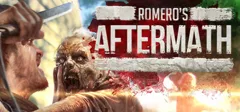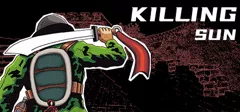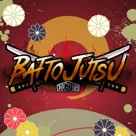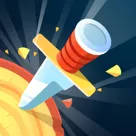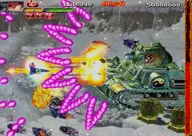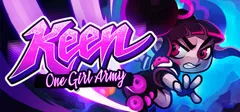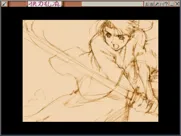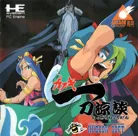John Romero's Daikatana
-
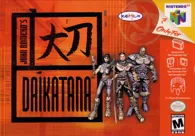 John Romero's Daikatana
(2000 on
Nintendo 64)
John Romero's Daikatana
(2000 on
Nintendo 64)
-
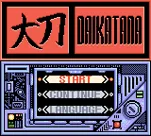 John Romero's Daikatana
(2000 on
Game Boy Color)
John Romero's Daikatana
(2000 on
Game Boy Color)
Description official descriptions
Hiro Miyamoto is a martial arts instructor and a member of an ancient clan of fighters. One day he learns that Kage Mishima, a sworn enemy of his clan, has gained possession of the Daikatana, a magical sword that allows its bearer to travel through time. As a result of Mishima's quest for power, a devastating disease is threatening humanity. Hiro and his friends must venture into different time periods, retrieve the sword, and defeat Mishima.
Daikatana is a first-person shooter using the Quake II engine. The game is divided into four episodes of several levels each, each episode taking place in a different time period: far-future Japan, ancient Greece, Dark Ages Norway, and near-future USA. The game uses cutscenes and text to tell the story. Two AI-controlled characters accompany Hiro throughout the quest, helping him in battles and also requiring protection. In addition to several different firearms, the Daikatana itself, which the player acquires in Episode 2, can gain experience and grow stronger as it is used. The game includes a multi-player deathmatch mode.
Spellings
- 大刀 - Japanese spelling
Groups +
Screenshots
Promos
Videos
Add Trailer or Gameplay Video +1 point
See any errors or missing info for this game?
You can submit a correction, contribute trivia, add to a game group, add a related site or alternate title.
Credits (Windows version)
165 People (140 developers, 25 thanks) · View all
| Lead Design | |
| Producer | |
| Lead Programmer | |
| Programming | |
| Level Designer | |
| Localisation Lead | |
| Script | |
| Art Director | |
| Lead Artist | |
| Artist | |
| Package Design | |
| Sound Director | |
| [ full credits ] | |
Reviews
Critics
Average score: 57% (based on 49 ratings)
Players
Average score: 2.6 out of 5 (based on 83 ratings with 12 reviews)
The Good
Intersting storyline. The nod to Nintendo's founder. Weapons are varied in certain levels, the ad campaign ION Storm ran (even though it killed this game), Romero's hair .
The Bad
Graphics, repetitive level design, cliched and rather racist side-kick characters, the insects and frogs, the hype.
The Bottom Line
This game would have been just as bad, that is to say it's par for the shooter course, had it not taken nearly half a decade to produce. Romero may have tried to re-invent the shooter, but came up well short of his mark. It's still the same find key, open door, shoot anything that moves gameplay from other mindless shooters. But not as good as more recent titles.
The hype surrounding this game didn't help either. No game could live up to the "do all end-all of gaming" moniker this game had going for it. Romero should have stayed with id. At least no one hated their lackluster titles (Quake2).
Windows · by Matt Grosvenor (1) · 2003
True Lies (the hazards of demos)
The Good
The first episode weapon models, the enemy creature models and the architecture throughout the game are extremely well done. The textures and miscellanous art leave little to be desired, striking new ground in style and quality.
The duo that you tow along in the game, while annoying when in your line of fire, provide good comic relief, great assistance in a firefight and are generally nice to have around. Kudos for ION's attempt at moving the industry forward.
The Bad
For every episode after the first, the weapon models degrade. By the fourth episode, the weapons have reached an all-time low. Bad animation, foul modeling and even worse coding makes for an arsenal that serves only to smear you, rather than your opponents.
While your partners AI is grand, your opponents are a far cry. Harking the days of Doom, upon catching sight of you an enemy will yell, and attempt to advance on your position, usually getting hung up on the beautiful architecture and generally making a complete fool of itself. If they're not stuck somewhere they will bee-line. Some enemies will attempt to play with you, for example the griffon or the mosquitoes which zip around and actually present a challenge for a marksman, but in the end there is no AI, simply a repetitive and predictable Action/Reaction system; Quantity, but no Quality.
Sound effects and music are sub par but livable, while voice acting leaves me laughing. A japanese swordsman does not have an American accent. Shadow Warrior is more believable.
Of all the details, however, one sticks out; sorest thumb of all, the Daikatana itself. This sword is horrible. No fluidity in the swings, unpredictable hit-scan (meaning you don't know where you're going to be slashing) not to mention the fact that you have no way of controlling which of four slashes you perform.
The RPG element is in sour need of a redesign. An attempt at creating an RPGish system wherein you gain experience and thus 'levels' through the slaying of 'baddies'. It doesn't fly very well simply because if you do not select the correct stats you will find yourself a bloody pulp too many times, and with load times reminiscint of pre-patch SiN you do not want to be reloading.
The level design, while breathtaking in more than one area, is linear to say the least. And if not linear you will find yourself wandering aimlessly trying to figure out where to go next (though this is quite rare). There is no similarity between functions, for example a door that looks like another will not function the same.
The Bottom Line
Download the demo and you will find it enjoyable. Buy the game and you will be throwing your money away on an amateur product that should have stayed in development for another week to create new weapons.
Overall I would not recommend buying this game simply because it is not what it should be, after four years in development. I have seen many user created modifications for many different games that of much higher quality than this (eg: Counter-Strike, or Gunman)
Windows · by tantoedge (19) · 2000
The Good
One surprising thing about Daikatana is that it genuinely should have been really, really good. Just look at its premise: an immersive first-person action game centered around time travel where every chapter has a unique feel and playstyle to it. It's unique, visionary, unprecedented, and at the same time absolutely doable with technology available at the time.
And that overall concept is still the game's biggest strength. The varied locations, distinct aesthetics, and differently paced levels all add to Daikatana's feeling of freshness. It doesn't really matter how flimsy and clichéd its excuse of a story is with a general premise this good.
Another thing Daikatana gets mostly right that's really important for an action game is the combat. Thanks to the varied time periods and aesthetics, each chapter has a separate and distinct arsenal, not restrained by the somewhat basic futurism of Quake II or the realism of Half-Life. Not every weapon is all that useful or satisfying to use, but the variety is enough to allow for freedom when it comes to playstyle and adapting to the game's challenges. Another interesting addition is the titular daikatana, a melee weapon that gets stronger with every enemy you kill with it, as opposed to being bound to the XP system like the other weapons.
The Bad
With so many good things about Daikatana, why is it not a good game overall? One reason is the level design. While not more convoluted than that of Doom or Quake (let alone some maps in Unreal), it definitely feels far less intuitive and at some points simply annoying. On top of that, chapters 1 and 4 really like to put enemies with hitscan weapons or very fast projectiles in places where they will see you immediately as you enter a room, often not allowing any time to properly dodge. Combined with an abundance of segments where you actually have to take (mostly fall) damage to progress, Daikatana feels a bit like a throwback to the NES era of artificial difficulty. Except here it's used simply to spite the player and not to pad the game's length despite technical limitations.
But Daikatana's biggest sin lies somewhere else - the infamous AI ally system. During large portions of the game you'll have 1 or 2 NPCs following you, with them being by your side necessary to move on to the next part of a level. A combination of friendly fire, awkward hitboxes, and most of all absolutely abysmal pathfinding makes the allies a waking nightmare that will impede your progress on numerous occasions in the most frustrating ways possible.
Despite Daikatana's notoriously long development cycle, you can tell the quality assurance portion of it was rushed. The game is mostly a finished product and definitely playable, but it does have its fair share of minor hiccups and annoyances surrounding hitboxes and collisions.
The Bottom Line
In short, Daikatana is a both unique and highly frustrating experience that doesn't quite live down to its terrible reputation, but is even farther from living up to the promise of its premise. 4/10
Windows · by Pegarange (296) · 2023
Discussion
| Subject | By | Date |
|---|---|---|
| Should I try it? | Unicorn Lynx (181775) | Dec 30, 2011 |
| incite PC gaming's Daikatana preview / interview video | Foxhack (32100) | Aug 19, 2007 |
Trivia
Advertisement
Long before Daikatana was released, an ad for it was run in several magazines stating "John Romero's Gonna Make You His Bitch." Needless to say this upset quite a few folks.
Daikatana Deathmatch
In April 2007, a fan team released Daikatana Deathmatch (DKDM), a multiplayer-only modification stripping the game from all the single player parts to reduce the file size for players who only want the multiplayer part. It still requires a full copy of the game to play. The link can be found in the related links section.
Development
Daikatana was in development for 3 years, exactly. The reason for the long development cycle was the switch to the Quake II engine. Romero decided to switch because of its colored lighting, among other graphical goodies, but when he finally received the source code, it was nothing like he pictured. Overall the story of the game's development and Ion Storm in general is as epic and profound as anything in the game. Check the related links for The Story of Daikatana.
Dialogue
The characters' sound files used in this game are not encrypted in any way. They're ordinary mp3 files which can be found in the data/sounds/voices folder of the Daikatana directory. There's quite a bit of unused dialogue in there which never made it into the full game. It seems the enemies and the player's two sidekicks were supposed to have more ambient dialogue (e.g. combat taunts, waiting sounds) than what was eventually used.
Dopefish
There are four Dopefish hidden in the game, one per time period.
German Windows version
In the German version enemy blood was colored grey, gore effects were removed and various human enemy modes changed, e.g. into robots or with an added mask to hide their face. A detailed list of changes can be found on schnittberichte.com (German).
Nintendo 64 version
The Nintendo 64 version misses violence in comparison to the original Windows version, e.g. purple instead of red blood. The PAL version was even cut further: the blood was replaced with sparks and civilians are immortal.
References
In the lobby of the Mishima Funeral Home/Crematorium, there's some solemn funeral-type music playing. This is really a slowed down version of the famous e1m1 music from DOOM.
Remix
As the sounds and dialog are not encrypted, one creative mixer was able to rearrange the dialog, add a little fake stuff here and there, add some bump-and-grind music, and came up with a long MP3 that sounds as if the two guys in the game were "engaging" the female sidekick. Computer Gaming World called it "the ONLY redeeming feature of Daikatana".
Sales
Daikatana sold 200,000 copies and had budget of over $10 million.
Awards
- Computer Gaming World
- April 2001 (Issue #201) – Coaster of the Year
- PC Powerplay (Germany)
- Issue 03/2005 - #8 Biggest Disappointment
- Issue 02/2006 - #7 Hype Disappointment
Information also contributed by Alan Chan, bkaradzic, Kalirion, Kasey Chang, Sciere, WildKard and Zack Green.
Analytics
Upgrade to MobyPro to view research rankings!
Related Sites +
-
Daikatana Deathmatch
A modification that strips the game from all the singleplayer content, to reduce the file size for multiplayer-only. It still requires a full copy of the game to play. -
Daikatana News
Daikatana news and info -
Daikatana v1.3 Unofficial Patch
Unofficial patch which fixes many bugs and adds new features. -
Matt Chat 55
Video interview with John Romero about the development of John Romero's Daikatana -
Planet Daikatana
Contains news, articles, FAQ, and media -
Something Awful review
A humorous review on Something Awful (PC demo) -
The story of Daikatana
From Gamespot: This Behind the Games feature gives us the inside look at Daikatana and the tragedies and triumphs behind one of the most talked about games in history. -
Wikipedia: John Romero's Daikatana
Information about John Romero's Daikatana at Wikipedia
Identifiers +
Contribute
Are you familiar with this game? Help document and preserve this entry in video game history! If your contribution is approved, you will earn points and be credited as a contributor.
Contributors to this Entry
Game added by Matthew Bailey.
Additional contributors: Trixter, Andrew Hartnett, John Romero, Sciere, Ms. Tea, DreinIX, Cantillon, Patrick Bregger, Frank Sapone, aKro.
Game added June 18, 2000. Last modified April 2, 2024.
